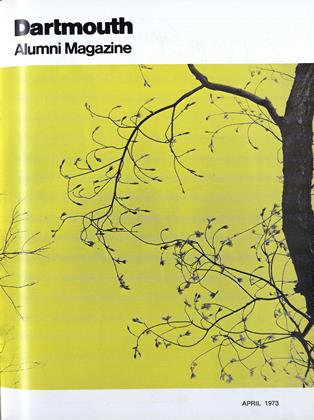Five Thayer School students are spending a major part of 20 weeks, this term and next, helping three New Hampshire and Vermont communities solve engineering problems.
Through the Engineering Resource Center, recently established by the Thayer School, the five are working in Hanover, in Keene, N.H., and in Killington, Vt., on a range of problems involving flood control, waste disposal, traffic flow, and snow making.
The center is funded in part by grants from the Spaulding-Potter Charitable Trusts and the Cogswell Benevolent Trust, both of Manchester, N.H.; the Markem Co., of Keene, N.H.; the Thayer School Partners Program; and the Alfred P.Sloan Foundation of New York. It was created for the dual purpose of providing practical experience of educational value for the students and offering capable pre professional assistance to area communities.
As Carl F. Long, Dean of the Thayer School, puts it: "Population growth, environmental legislation, and citizens' demands for increased and better community services are causing communities to turn to engineering and consulting firms for aid in solving problems generated by an increasingly technologically oriented society and for help in planning for orderly future growth. Professional aid is expensive and in many instances beyond the resources of those smaller towns and cities that are most in need of such help."
While it provides valuable field work for the engineering students and benefits to the communities, the program also satisfies a major requirement for the C.E. degree: a demonstration of the student's skill in identifying an engineering problem and then solving it. And financial practicability must be taken into account too, Dean Long notes. "The student not only must consider the design aspects, but also whether his system is economically feasible for the community involved. Good design goes hand-in-hand with sound economics."
Donald Hooper of Lynnfield, Mass., and Vincent Peck of American Fork, Utah, are both working in Keene, the former on water retention and storage systems to prevent flooding during spring periods of peak run-off and heavy rain, the latter on alternatives for solid waste disposal.
Ned Dripps of Pittsburgh and Lawrence Elia of Lewiston, N. Y., are devising a plan to improve traffic flow between Hanover and Interstate 89.
Alexander Meleney of Dobbs Ferry, N.Y. is working on a system to produce cheaper and better artificial snow in Killington, where the economic well-being of the community is heavily dependent on major skiing and recreational activities.
All five students are members of the Class of 1972, in the final year of their five-year engineering program.
 View Full Issue
View Full Issue
More From This Issue
-
 Feature
FeatureMedical Care via Television
April 1973 By BLISS KIRBY THORNE '38 -
 Feature
FeatureGuatemalan Cane Raiser
April 1973 By M.B.R. -
 Feature
FeatureArt Carpenter
April 1973 -
 Feature
FeatureHanover Has A Mardi Gras
April 1973 -
 Article
ArticleFaculty
April 1973 By ROBERT B. GRAHAM '40 -
 Article
ArticleThe Undergraduate Chair
April 1973 By DREW NEWMAN '74
Article
-
 Article
ArticleCAMPUS NOTES
May 1921 -
 Article
ArticleJoint Financial Study
MARCH 1972 -
 Article
ArticleStatement of Ownership, Management and Circulation (Required by 39 U.S.C. 3685)
NOVEMBER 1999 By Sean Plottner -
 Article
ArticleStatement of Ownership, Management and Circulation (required by 39 U.S.C. 3685).
Nov/Dec 2009 By Sean Plottner -
 Article
ArticleThe Changing Season
December 1935 By The Editor -
 Article
ArticleWestchester
October 1973 By VICTOR S. RICH '61


